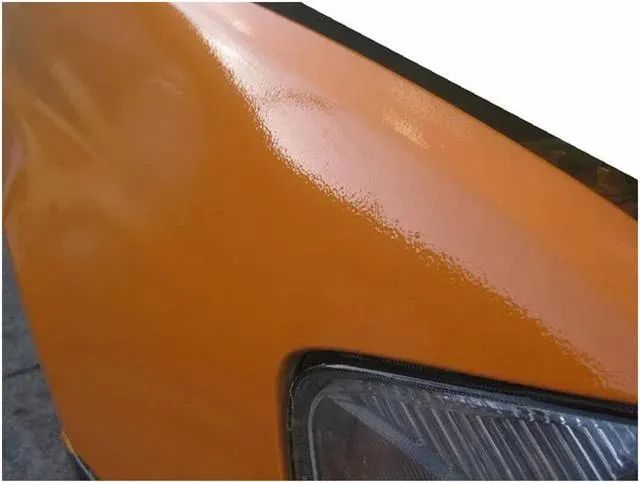In the automotive refinishing industry, Orange Peel refers to an uneven, textured surface on the paintwork that resembles the skin of an orange. This texture reduces surface smoothness and gloss, negatively affecting the appearance and overall finish quality of the vehicle.

Low spray gun pressure results in poor atomization, causing large paint droplets that cannot evenly distribute on the surface, leading to orange peel.
Solution: Adjust spray gun pressure within the range recommended by the paint manufacturer.
Paint with excessive viscosity has poor flowability, making it difficult to level properly after spraying.
Solution: Use the correct thinner to adjust paint viscosity to the recommended spraying level.
Holding the spray gun too far away or moving too quickly causes the paint droplets to partially dry before reaching the surface, leading to uneven application.
Solution: Maintain an appropriate spraying distance and consistent speed to ensure even flow on the surface.
Rapid solvent evaporation or high ambient temperature causes the surface to dry quickly while the inner layer remains unsettled, creating an uneven finish.
Solution: Select the right combination of solvents and thinners, and control the spraying environment's temperature and humidity.
A rough or contaminated substrate prevents proper paint adhesion and smooth leveling, resulting in orange peel texture.
Solution: Ensure the substrate is smooth and clean. Sand and clean the surface thoroughly when necessary.
Using mismatched spray gun nozzles, air caps, or needles, or failing to calibrate the equipment, can negatively affect spraying quality.
Solution: Choose spray equipment and accessories suitable for the type of paint and ensure regular calibration.
Incorrect ratios of hardeners, additives, or incompatible formulations can lead to orange peel problems.
Solution: Strictly follow the manufacturer’s recommendations for mixing ratios of hardeners, additives, and other materials.
Maintain spray gun pressure within the recommended range to ensure proper atomization and an even, smooth finish.
Tip: Regularly calibrate spray equipment to ensure correct pressure output.
Both overly high and low viscosity can affect the spraying effect. Adjust thinner ratios according to environmental conditions and paint type.
Tip: Use a viscosity cup to measure paint viscosity and ensure it falls within the recommended range.
Spraying too far or too quickly results in poor coverage and uneven flow.
Tip: Keep the spray gun approximately 15-20 cm from the surface and move steadily at a consistent speed.
Incorrect nozzle sizes or air caps can cause orange peel.
Tip: Select spray gun setups based on the type and viscosity of the paint and use the recommended nozzle sizes.
Temperature and humidity significantly affect paint drying and leveling.
Tip: Maintain a stable spraying environment at approximately 20-25°C and 50-70% relative humidity.
The substrate must be smooth, clean, and free from oil, dust, or other contaminants to ensure uniform paint adhesion.
Tip: Thoroughly clean, sand, and remove dust from the surface before spraying.
Solvent evaporation rates and additive use greatly influence paint leveling and drying. Incorrect choices can lead to orange peel.
Tip: Use only solvents and additives recommended by the paint manufacturer, considering environmental conditions.